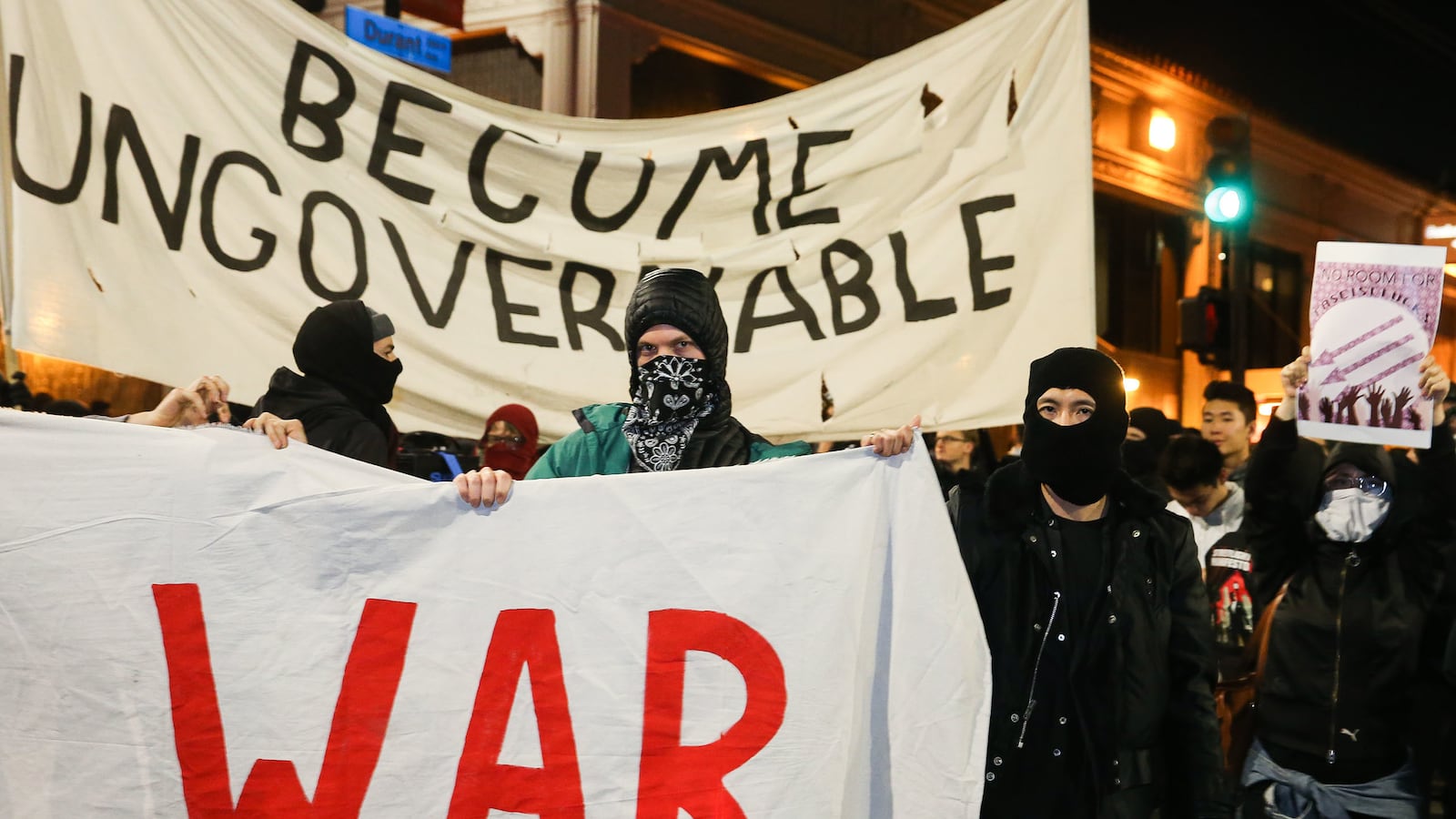In March 1969, a memo warned President Nixon to expect increased violence on college campuses that spring. “Good!” Nixon wrote across it.
The president knew something about civilization that social science research later confirmed: Violent demonstrations, riots, and property destruction did not threaten his government. On the contrary, these spectacles made average citizens more sympathetic to the kind of law-and-order policies Nixon wished to enact.
It’s a shame that today’s anti-fascist and anarchist black bloc rioters on college campuses have not absorbed this lesson.
On Wednesday night, 150 masked protesters attacked a planned Milo Yiannopoulos event at the University of California, Berkeley. Yiannopoulos, an editor at the explicitly pro-Donald Trump news outlet Breitbart, holds views anathema to the black bloc and is one of the most recognizable unofficial surrogates of Trump-ism.
While students at Berkeley and other campuses have previously engaged in censorship, the group that struck campus the other night mostly consisted of non-students, according to reports. The masks, of course, make it hard to tell.
The protesters launched Roman candle fireworks at the building where Yiannopoulos was scheduled to speak. They smashed windows and tore down a police barricade. Using gasoline, they managed to start a large fire in the middle of the street that at one point threatened to engulf a nearby tree. At least one person who had come to see Yiannopoulos was beaten bloody during the skirmish. The university administration had no choice but to cancel the event, as Yiannopoulos was evacuated from campus.
In 1964, Berkeley students birthed the free speech movement in order to liberate the campus from prohibitions on political speech. In 2017, Berkeley burned as misguided protesters censored the speech of someone whose political views they disliked.
Yiannopoulos deserves plenty of criticism. His views need no introduction: He routinely insults women and minorities, likens feminism to cancer, mocks transgender people, and makes vile comments about people who criticize him. His headlines at Breitbart are so offensive that presidential candidate Hillary Clinton actually read them off during a televised speech about the extremism of Trump adviser Steve Bannon, who headed Breitbart before joining the campaign.
When conservative student groups invite Yiannopoulos to speak, they aren’t necessarily endorsing his deeply offensive message, or Bannon’s, or Trump’s. They are necessarily engaging in a performative free speech demonstration. Conservative students are frequently censored by public university administrations for even mundane kinds of expression (i.e., handing out copies of the Constitution), and bringing Yiannopoulos to campus is a form of revenge.
Those groups deserve criticism, too. It can’t be too hard to find a conservative speaker who would gleefully trigger delicate campus liberals while also adding something of substance to the debate. Yiannopoulos isn’t even a particularly strong vehicle for the anti-censorship message, given that his own supporters lash out at their critics with just as much illiberal fervor, and occasionally, with violence.
All that said, it remains a fact that Berkeley is a public university, and students should have the right to bring someone to campus who has the sole intention of hurling insults at people. Public universities should serve as bastions of unfettered free expression—both because the First Amendment requires it and because free speech is the condition under which enlightened thought flourishes. As left-leaning intellectual Noam Chomsky famously put it, “If we don’t believe in freedom of expression for people we despise, we don’t believe in it at all.”
The principled argument for free speech obviously isn’t persuasive for the masked “resistance” that considers Trump and his surrogates an existential threat to civil society that must be opposed by any means necessary.
They should consider this: The means they deployed at Berkeley will help Trump-ism in the long run. Fascism is not undermined by tactics that are themselves inherently fascist.
If the Nixon anecdote doesn’t persuade them, violent protesters should read Omar Waslow, an assistant professor of politics at Princeton University. Waslow’s study found that violent protest movement in the 1960s and 1970s provoked a backlash among conservative voters (PDF). Violent tactics drove voters into the arms of the more right-wing, law-and-order candidate, according to Waslow. Nonviolent protests, however, did not correlate with any statistically observable backlash.
Other studies have reached similar conclusions about the likelihood of violent protests to fail, or even backfire, relative to nonviolent protests (PDF). And of course, when protesters prevented Trump himself from speaking at an event during the campaign, a poll of likely Republican voters found that they were more likely to vote for Trump because of the behavior of the censors.
The vast majority of Americans have never heard of Yiannopoulos, and would find his views abhorrent. By effectively shutting down his speech, protesters up his profile, even as they put him in an undeservedly sympathetic light and they they turn their own violent and destructive behavior into the story. It makes them look bad, and adds to Yiannopoulos’s image as a victim of liberal intolerance. Indeed, after Wednesday night’s incident, Yiannopoulos wrote on Facebook that his book, Dangerous, was back on Amazon’s top 30 bestsellers list.
“They’re just making him more famous,” Kevin Quigley, a UC Berkeley sophomore who attempted to attend Yiannopoulos’s speech, told me in an interview. “I feel like the best way to figure out our differences is through discussion, not just breaking stuff.”
Some may say that desperate times—the election of Trump—call for desperate measures, even though those measures have often failed in the past. I would ask them to take a mental picture of Nixon gleefully learning about the increased violence on college campuses, and then replace Nixon with Trump, who has just learned from Bannon that anti-Yiannopoulos protesters resorted to violence to shut him down.
Would Bannon and Trump be saddened to learn this news? Or would they see it as an opportunity?
Oh, by the way, here’s what Trump tweeted at 6:13 a.m. Thursday morning:
“If U.C. Berkeley does not allow free speech and practices violence on innocent people with a different point of view - NO FEDERAL FUNDS?”
Quite the mystery, huh?






